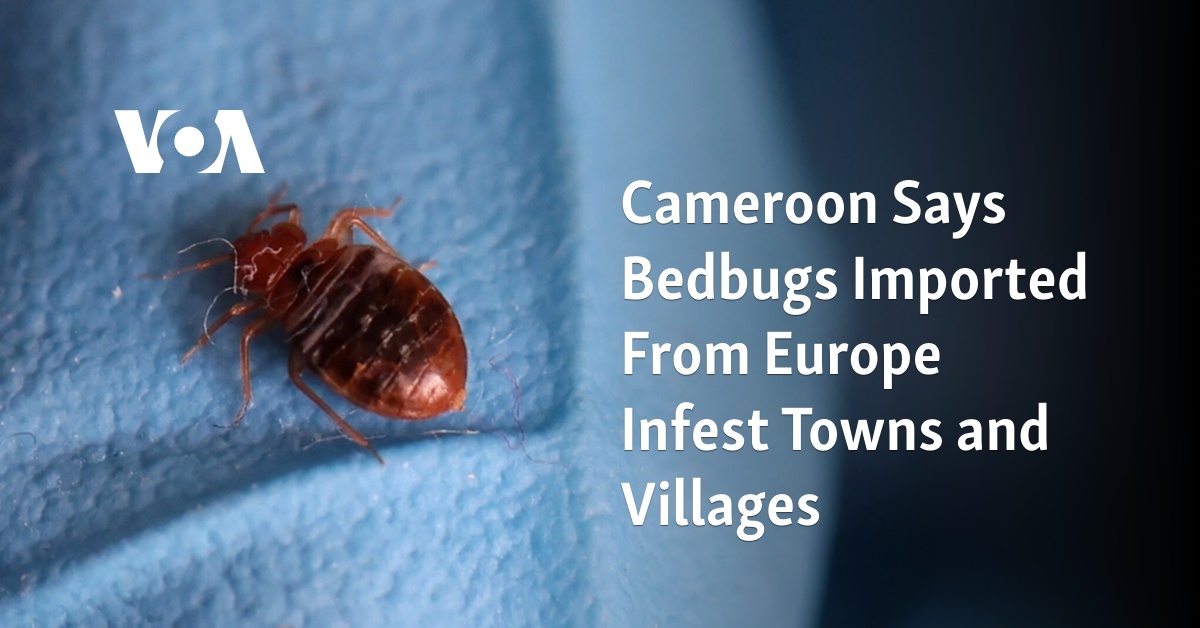Sanitation and health workers in Cameroon are disinfecting homes to kill bedbugs that have infested the central African state’s capital, Yaounde, and several towns and villages. Government officials say the bloodsucking bugs are imported by travelers from Europe, where some countries are also experiencing infestation.
Cameroon residents say they are expecting teams from the central African state’s hygiene and sanitation service to come to their homes to help get rid of the bugs.
Fruit seller Kuffo Marilyne lives in Madagascar, a neighborhood in Yaounde. She said she first used insecticides to get rid of the bugs in her home, thinking they were little cockroaches. She said she was surprised when three of her children developed insomnia and experienced irritation after they were bitten by the insects.
Bedbug bites leave blisters or large rashes on the skin, health workers say.
Kuffo said she took her children to the hospital for treatment, but that a majority of her neighbors who also reported bedbugs in their homes are poor and unable to get their children medical care.
Cameroon’s government reported that huge numbers of bedbugs have infested homes in several poor Yaounde neighborhoods.
Cameron’s health ministry said the bugs come out at night to feed on human blood and often cause psychological distress, sleeping issues, anxiety and depression.
The government said it has dispatched several hundred sanitary and health workers to disinfect homes and kill the bugs.
Mariline Longue a medical staff member at the Cite Verte District Hospital in Yaounde, said more than 70% of people in some of Yaounde’s congested neighborhoods have reported bedbugs in their homes and shops. Longue said 24 of the 30 houses they visited in Cameroon’s capital on Wednesday morning had huge numbers of bedbugs hidden in mattresses, cracks of bed frames, chairs and couches.
The government said besides Yaounde and the economic hub Douala, there are fears several other towns and villages have been infested.
Maritial Ayissi, a sanitation officer with the Yaounde City Council, said the bugs are coming from European countries.
Ayissi said it is unfortunate government officials did not take measures to protect borders when the Cameroon National Hygiene and Sanitation Association raised an alarm in September that people were coming in from Europe with bedbugs in their luggage. He said many secondhand goods including mattresses, blankets and dresses that are imported by merchants from France in particular and sold in Cameroon have huge numbers of bedbugs hidden in them.
Ayissi said the bugs have become increasingly resistant to chemical treatments after they disappeared from daily life more than 20 years ago.
Rights groups and civil society activists have expressed fears that the insects may turn up in neighboring states, including landlocked Chad and Central African Republic, that rely on Cameroon for most of their goods. More than 80% of goods imported to Chad and CAR from Europe pass through Cameroon’s Douala seaport.
Cameroon officials said they will disinfect airports and goods imported from Europe if reports about bedbugs being found in them are investigated and found true.
In September, France announced that travelers were posting photos and videos purportedly showing bedbugs in Paris’ local transport system, high-speed trains and at Charles de Gaulle airport, provoking a wave of panic.
The French government in October said there was no evidence of any resurgence of the biting irritants on public transport, but it did not dismiss reports the insects were found in some homes.







